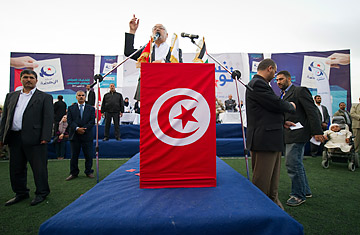
Rached Ghannouchi, the founder and leader of the Ennahda Islamist movement, speaks during a meeting in Ben Arous (southern Tunis) on Oct. 21, 2011
(2 of 2)
Ben Ali left Tunisia reeling from the effects of a deeply corrupt political economy, a heavy-handed police force and high unemployment. Few of the unemployed youth in the revolution's center of Sidi Bouzid, where the self-immolation of a vegetable seller set off the uprising, have found relief in the event's aftermath. And the debate over an Islamist-vs.-non-Islamist solution has in some ways further highlighted the divides between urban and rural, employed and unemployed, educated and less educated. Most commonly, perhaps, it represents the rift between those who lived comfortably, albeit silently, under Ben Ali and those who gained nothing from his rule. "Religion is going to help because it will tame us," says Ayeshi Rabhi, an unemployed 23-year-old from Kasserine, in the country's poor interior. "The state is corrupt. We need religion to purify us."
Rabhi plans to vote for Ennahda, more because it seems an obvious choice, he says, than out of any personal commitment to the party. It's a tendency that some say underscores a political vulnerability in the months ahead. Many of Ennahda's young followers are more strongly influenced by the fundamentalist Wahhabi preachers they see on television than by the party's elites, recently returned from abroad, says Jebloui.
Last week, violent protests erupted after Nessma TV, a private station, broadcast the award-winning animated film Persepolis, a story about the Iranian revolution in which a girl's imagined version of God takes human form. Islamists and even some liberals deemed the film blasphemous for portraying an image of God. In the uproar that ensued, protesters clashed with police and attacked the TV station and the home of its owner. "What happened with Nessma was very important," Redissi says of the protests that sent Tunisians into a soul-searching debate over the religious character of the state and freedom of expression. "Either people are going to rally around Islamists," giving them an edge in the polls, he says, "or [what happened] will provoke a fear reaction and people we will say, 'These people are dangerous.' "
If the latter scenario plays out, the Islamists are likely to scale back the religious rhetoric and rethink their strategy. If the protests yield more votes, however, they will be emboldened to pursue dramatic religious-based legislation, he argues.
There are those who say that Redissi, Jebloui and others who have voiced such fierce opposition to the Islamist rise are overdramatic alarmists. After all, Ennahda officials have given little indication that the party would pursue any policies that deviate strongly from Tunisia's liberal, secularist tradition of government. Polls suggest that other parties, including the old opposition, the Progressive Democratic Party and the leftist Congress for the Republic, are likely to gain a sizable number of assembly seats as well.
Either way, few deny how important this election is. Where Tunisia's uprising last winter was the all-important domino that set off an Arab Spring of revolutions and regionwide dissent, so too will the Oct. 23 vote serve as both a catalyst and a harbinger for what's to come. "It's a very important test," Redissi says. "If it works in Tunisia, I'm sure that all the other regimes in the Arab world will try to imitate the Tunisian case. If it doesn't succeed here, nowhere will it succeed."
And if the Islamists win in Tunisia, he adds, "Kayf, kayf" — that is, likewise, they will sweep the region. "And you can put an X through the Arab Spring."
